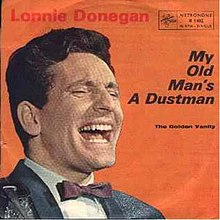My Old Man's a Dustman
| "My Old Man's a Dustman" | ||||
|---|---|---|---|---|

Sleeve for the Scandinavian pressing on Metronome Records
|
||||
| Single by Lonnie Donegan | ||||
| Released | 16 March 1960 | |||
| Format | 45, 78 | |||
| Recorded | 20 February 1960, Gaumont Cinema, Doncaster | |||
| Genre | Folk, music hall | |||
| Length | 3:21 | |||
| Label | PYE Records | |||
| Writer(s) | Lonnie Donegan, Peter Buchanan, Beverly Thorn | |||
| Producer(s) | Unknown | |||
| Lonnie Donegan singles chronology | ||||
|
||||
"My Old Man's a Dustman" is a song first recorded by the British skiffle singer Lonnie Donegan. It reached number one in the British, Australian, Canadian and New Zealand singles charts in 1960.
The song was written by Lonnie Donegan, Peter Buchanan (Donegan's manager between 1956 and 1962), and Beverly Thorn; Thorn was not credited on the original release. According to his autobiography, Beverley Thorn was a pseudonym of Leslie Bricusse, the songwriter who wrote hit shows with Anthony Newley.
It probably has its origins in "My Father Was a Fireman", a song sung by British World War I troops. The two songs share a lyrical similarity in their reference to "gorblimey[1] trousers". A song beginning with the line "My old man's a dustman", but otherwise sharing no lyrics with Donegan's, is recorded as a playground song in a 1956 novel. This song tells of the exploits of the protagonist at the Battle of Mons. A version concerning a football game and beginning "My old man's a scaffie [dustman or street-sweeper, from scavenger]/He wears a scaffie's hat" (echoing the first two lines of Donegan's song) is recorded as a Scottish playground song during the 1950s. A very similar song, beginning "My old man's a baker", is recorded in Chester-le-Street in 1967. All of these songs share the same metric structure.
The song represented a change in style for Donegan, away from American folk and towards British music hall.
On 16 March 1960, through Pye Records in the UK, Donegan released a version of the song recorded live at the Gaumont cinema in Doncaster just a few weeks earlier, on 20 February. The B-side was a version of the English folk song "The Golden Vanity". The single reached number one in the UK Singles Chart on 31 March and maintained that position for four weeks. It also reached number one in Ireland, Australia and New Zealand and on the Canadian CHUM Chart, selling over a million copies in total.
...
Wikipedia
